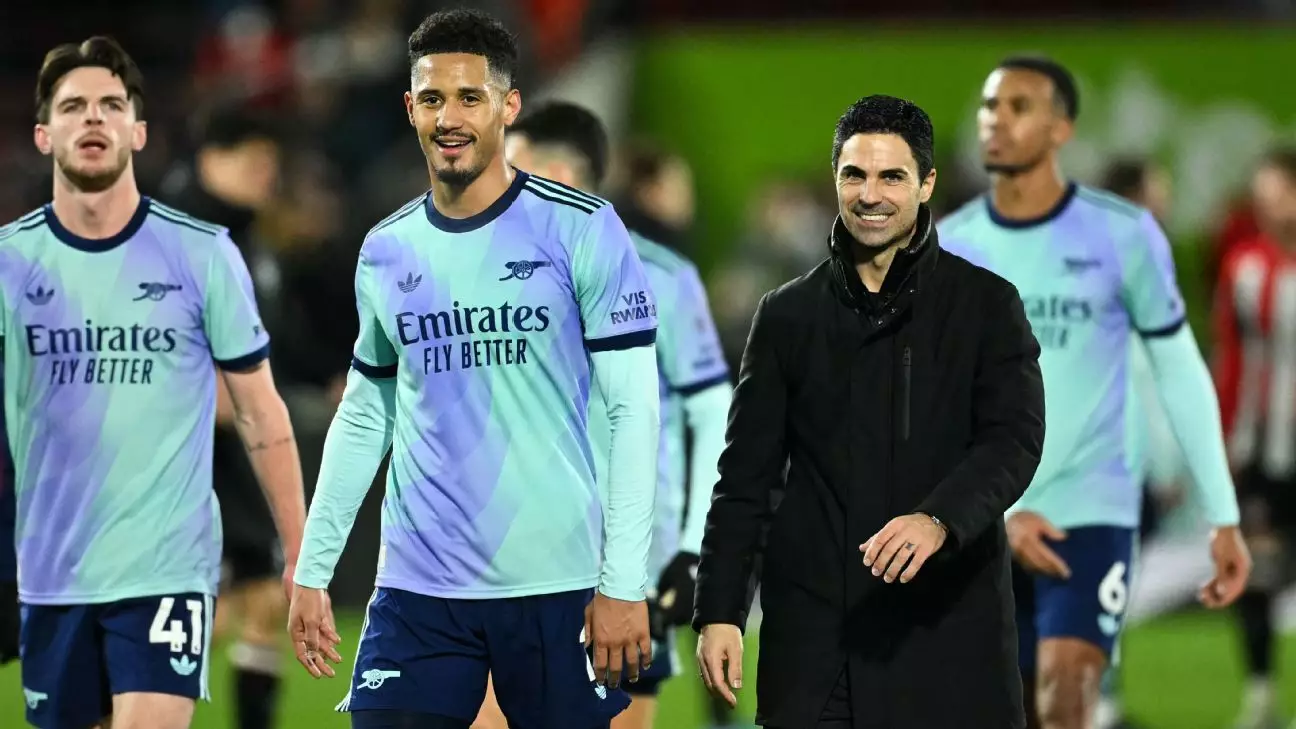As January unfolds, Arsenal finds itself at a defining crossroads in its quest for Premier League success. With Bukayo Saka sidelined due to hamstring surgery until March, manager Mikel Arteta faces a familiar challenge: ensuring that the team’s attacking prowess is sufficient to close the gap on league leaders Liverpool. The recent 3-1 victory against Brentford has raised more questions than answers about the squad’s depth and the strategic choices required in the upcoming transfer window.
Arteta’s decision to hand teenager Ethan Nwaneri his first league start in Saka’s right-wing position was a noteworthy gamble that seemed to pay off. Nwaneri, despite his youth, demonstrated composure and creativity, contributing to Arsenal’s goals in the second half. This performance has sparked a debate among supporters and analysts alike regarding whether the team possesses adequate firepower to contend for the title, especially during a crucial phase where every match could make or break their aspirations.
The absence of key players has underscored the need for Arsenal to adapt quickly. Saka’s injury, compounded by Kai Havertz’s illness, left a noticeable void in the attacking lineup. Yet, the Gunners managed to narrow the gap at the top of the table, signaling resilience and an ability to regroup under pressure. Nevertheless, an undercurrent of anxiety persists among fans, with many clamoring for reinforcements in the January transfer window to bolster the squad’s attacking capabilities.
Arteta’s pre-match statements highlighted a stark reality: despite breaking numerous records in recent years, the quest for major trophies remains elusive. This acknowledgment not only reflects internal ambitions but also connects with the frustrations of supporters who yearn for tangible success. Speculations regarding a potential new signing, particularly a forward who can provide much-needed creativity and scoring ability, have gained traction. The case of Benjamin Sesko, who was once on Arsenal’s radar, illustrates the challenges clubs face in acquiring the right talent at the right time.
Interestingly, the match against Brentford revealed positive signs for Arsenal’s attacking dynamics. The resurgence of Gabriel Jesus and Gabriel Martinelli in front of goal could not have come at a better moment. Jesus’s remarkable turnaround, scoring six goals in four matches after a lengthy drought, highlights his importance to the squad. Martinelli, too, has found his scoring touch, boosting the team’s confidence as they navigate a congested fixture schedule.
Arteta’s comments post-match illuminated a key strategy: Arsenal’s ability to diversify its attacking threats. The manager emphasized the significance of sharing goals among the squad as a critical component of their offensive philosophy. This multi-faceted approach could alleviate some pressure on individual players while allowing the team to thrive collectively.
However, the question remains: is the current squad deep enough to cope with the rigors of competing in multiple tournaments? The manager expressed faith in the versatility and willingness of his players to adapt, but the reality of injuries or unexpected circumstances could quickly shift the narrative. As Arsenal contemplates its options for the January transfer window, the decision-makers will need to strike a balance between bolstering the squad and trusting the existing players’ potential.
Nwaneri’s promising debut and the tactical choices made by Arteta indicate a willingness to harness youthful energy while being mindful of the demands that come with it. Relying too heavily on a young player in a critical role risks setting unrealistic expectations and pressure. Adequate support around him will be necessary to ensure his development is nurtured rather than stunted by the weight of responsibility.
As the January transfer window opens, Arsenal is faced with a plethora of options and considerations. The club must weigh the potential benefits of acquiring new talent against the inherent risks involved. Injuries can derail even the most promising campaigns, but so can hasty purchases that disrupt team chemistry.
Arteta’s previous statements underscore a patient approach—selecting players that align with the club’s philosophy rather than impulsively reacting to immediate needs. The aim should not just be about filling gaps, but enhancing the overall quality of the squad, ensuring that Arsenal can maintain a sustained challenge for the Premier League crown.
Ultimately, the path to success for Arsenal lies not merely in bolstering their ranks but in fostering a robust squad mentality that embraces both challenges and opportunities. The decisions made this January will resonate far beyond the immediate context, potentially redefining the club’s trajectory as they seek to transform recent progress into tangible accolades.

Leave a Reply